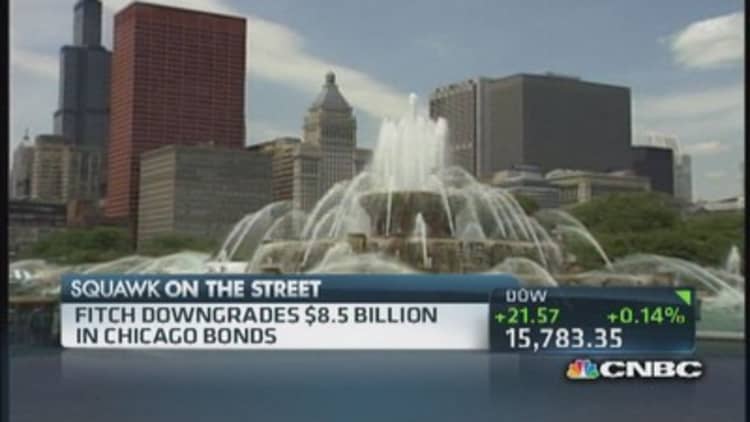Spillover effects after Chicago's ratings downgrade are expected to remain minimal, but municipal bond investors may be feeling nervous that there are other shoes to drop.
In recent months, the $4 trillion municipal bond market has been rattled by Detroit's bankruptcy, Puerto Rico's fiscal pains and unfunded pension liabilities in several other states. According to the latest research from Morningstar, worried investors have been retreating heavily from muni funds since March.
Adding insult to injury, Fitch Ratings docked Chicago's bond ratings by three notches Friday evening, with a negative outlook, citing the city's tepid economy and its bubbling unfunded pension liability.
"I don't think professional investors should be surprised by [Chicago's ratings cut] at all," said Marilyn Cohen, president of Envision Capital, noting that Chicago's pension problems have been several years in the making. "And I doubt there will be a big reaction in the bond market."
The bond market is closed Monday in observance of the Veterans Day holiday.
(Read more: Save cities or let them go bankrupt?)
Fitch downgraded $8 billion in Chicago's unlimited tax general obligation bonds to A- from AA- and also lowered $497.3 million in sales tax bonds to A- from AA-.
"The downgrade reflects the lack of meaningful solutions to both the near-term and long-term burden," according to the credit ratings agency. "The city has been unsuccessful it its attempts to negotiate a solution with labor unions and lobby the state legislature."
Despite the downgrade, Bob DiMella, co-portfolio manager of the MainStay Tax Free Bond Fund, said Chicago's recent credit downgrade is not necessarily the start of a domino effect.

"This year, the fundamental credit cycle in the muni market is positive, not negative—there have actually been more upgrades than downgrades," he noted. "Detroit was a blip on the radar screen and Chicago will be as well. [Chicago] has a structural imbalance and this is more like a collateral damage [following] the downgrade in Illinois [in June]."
(Read more: Banker: Goes without saying Detroit must cut pensions)
Illinois was slapped with an A- rating by Fitch with a negative outlook in June, affecting $27.5 billion of outstanding debt. Even before the downgrade, Illinois had one of the lowest credit ratings in the nation as the state struggled with a nearly $100 billion unfunded pension liability. The agency warned that Illinois' lower rating could be in further jeopardy if the state does not take action to stabilize its finances.
"It's possible to see another downgrade in Chicago—but we believe they are not going to go below investment grade," said DiMella. "We believe they have the revenue they need and once they figure out investment for pensions, you'll see stability again."
In October, Chicago Mayor Rahm Emanuel called for pension reforms, proposing a spending plan for the third-largest city including a hike in the cigarette tax, higher zoning permit fees for big developments and an end to some retirees' health insurance.
"A bankruptcy filing in Chicago? Anything's possible," said Cohen. "Unless they get their act together, [problems] will compound and they won't be able to handle it. Rahm Emanuel is a smart guy—he needs to stop letting unions pull him by the nose ring!"
—By CNBC's JeeYeon Park (Follow JeeYeon on Twitter: @JeeYeonParkCNBC)
Questions? Comments? Email us at marketinsider@cnbc.com


